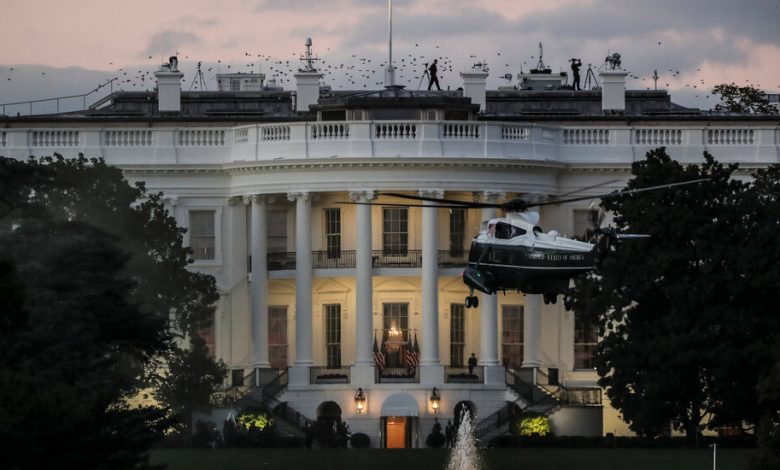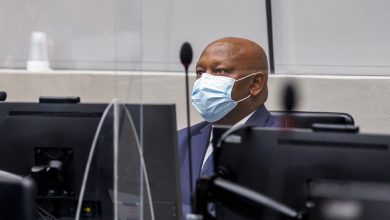Jan. 6 and Mar-a-Lago Inquiries Converge in Fights Over Executive Privilege

WASHINGTON — Two high-profile criminal investigations involving Donald J. Trump are converging on a single, highly consequential question: How much residual executive privilege can a former president invoke after leaving office?
As the Justice Department investigates both Mr. Trump’s attempt to overturn the 2020 election and his retention of sensitive documents at his Florida residence, his legal team has repeatedly claimed that he has retained power to keep information secret, allowing him to block prosecutors from obtaining evidence about his confidential Oval Office communications.
President Biden is not backing Mr. Trump’s attempt to use that power, and many legal scholars and the Justice Department have argued that he is stretching the narrow executive privilege rights the Supreme Court has said former presidents may invoke. But there are few definitive legal guideposts in this area, and the fights could have significant ramifications.
In the short term, the disputes could determine whether Mr. Trump is able to use the slow pace of litigation to delay or impede the inquiries. They could also establish new precedents clarifying executive secrecy powers in ways that will shape unforeseen clashes involving future presidents and ex-presidents.
“This is tricky stuff,” said Mark J. Rozell, a George Mason University professor and author of “Executive Privilege: Presidential Power, Secrecy and Accountability.” “That gets to the point where the Trump era changed things and raised these kinds of questions that before were unthinkable to us.”
Executive privilege can protect the confidentiality of internal executive branch information from disclosure. The Supreme Court first recognized it as a presidential power implied by the Constitution during the Watergate era, and only a handful of opinions have sketched out its parameters over the decades, in part because current and former presidents typically work out such issues in private.
The issue under debate in the two Trump cases, presidential communications privilege, can protect a president’s discussions with White House aides — or their interactions with each other — that relate to presidential decision-making.
Such communications may be vital evidence in determining Mr. Trump’s actions in the period between the 2020 election and the attack on the Capitol on Jan. 6, 2021.
In the Jan. 6 investigation, the Justice Department has obtained grand jury subpoenas for several former aides to Mr. Trump seeking testimony about his conversations. Mr. Trump’s lawyers have instructed them not to answer questions, based on a broad conception of his residual powers of executive privilege, even though Mr. Biden has rejected the idea as not in the best interests of the United States.
More on the Trump Documents Inquiry
- Special Master: Judge Aileen M. Cannon granted former President Donald J. Trump’s request for an independent arbiter, known as a special master, to review the documents seized from Mar-a-Lago, appointing Judge Raymond J. Dearie of the Federal District Court in Brooklyn.
- Dueling Moves: Judge Cannon later eased several demands that Judge Dearie had imposed on Mr. Trump’s lawyers, reflecting a larger struggle over who should control the rules of the review — and whom those rules would favor.
- Access to Files: After Judge Cannontemporarily barred the Justice Department from using the records marked as classified that had been seized from Mr. Trump’s Florida residence, an appeals court ruled that the department could regain access to them.
- ‘Giant Backfire’: Mr. Trump’s demand for a special master has failed to derail the criminal investigation into his hoarding of sensitive documents. Now he is stuck paying for a costly process that threatens to undermine his public claims.
A dispute over whether those witnesses may lawfully decline to answer certain questions is now playing out before Beryl Howell, the chief judge of the Federal District Court for the District of Columbia, behind closed doors, according to people familiar with the matter.
In the documents investigation, Mr. Trump’s lawyers have convinced a judge he appointed in November 2020, Aileen M. Cannon of the Southern District of Florida, to name a special master to oversee the vetting of some 11,000 documents and records the F.B.I. seized from his Florida residence, Mar-a-Lago, in August.
Over the Justice Department’s objections, Judge Cannon ruled that Mr. Trump can make the case to the special master — and, ultimately, to her — that some of the documents should be withheld from investigators under executive privilege. She rejected the department’s argument that Mr. Trump was entirely foreclosed from raising the privilege in these circumstances.
But Judge Cannon has also hedged, writing that Mr. Trump should have the ability to invoke the privilege “as an initial matter” but also suggesting that any assertion in this context might ultimately fail. For its part, the Trump legal team has shied away from explaining why material covered by executive privilege would be off limits to investigators with the Justice Department, a component of the executive branch.
“Trump’s team has not been entirely clear in asserting their executive privilege claims in their early briefs,” said Michael Stern, a former counsel with the House Permanent Select Committee on Intelligence who writes on issues involving investigations, national security and the law. “They have laid out a broad argument, but it remains to be seen how, exactly, they are going to make their case as these issues move up to appellate courts.”
The special master Judge Cannon appointed, Judge Raymond J. Dearie, had instructed Mr. Trump’s lawyers to go through the seized records and distinguish between those they think are merely shielded from disclosure to people outside the executive branch, which is not unusual, and those they think the executive branch itself supposedly cannot review, a much more radical proposition. He also wanted them to explain why for each document.
Mr. Trump’s legal team chafed against articulating any such distinction. And on Thursday, Judge Cannon relieved his lawyers from fulfilling Judge Dearie’s request, saying in an order that they need only categorize something as subject to executive privilege in general.
No president has ever successfully invoked executive privilege to hide information from members of the executive branch, like Justice Department investigators, as opposed to outsiders, like members of Congress. And no former president has ever successfully invoked executive privilege when the current president opposes it.
But such questions rarely arise, and the handful of cases on the topic have left many questions unresolved. Few of those rulings define the limits of the privilege in the context of a criminal investigation, and even fewer address the issue of a former president’s powers.
Mr. Trump’s power play also arguably challenges a philosophical tenet of the conservative legal movement that worked closely with his administration to appoint jurists associated with the Federalist Society, including Judge Cannon, to the bench.
Many connected to the conservative legal movement embrace an ideology, known as the unitary executive theory, that the Constitution vests all federal executive power in a single person: the president. Allowing a private citizen who used to be in the White House to successfully invoke executive privilege against the president would fracture that control.
“There is a decent argument that it does” infringe upon the current president’s rightful powers, William P. Barr, the former attorney general under Mr. Trump, said in a text.
(Mr. Barr used his authority to shield Mr. Trump in office, but after the 2020 election, he refused to back Mr. Trump’s false claims of a stolen election. The two have since traded criticisms, with Mr. Barr disparaging Mr. Trump’s request for a special master.)
From the other end of the political spectrum, Bob Bauer, a former Obama White House counsel who is now Mr. Biden’s personal lawyer, also dismissed Mr. Trump’s privilege argument.
“Trump’s legal team is facing very long odds, to say the least,” Mr. Bauer said. “But they may see strategic value in slowing things down by litigating every last strained argument. So it is more ploy than law.”
The Supreme Court first said that the Constitution implicitly gives presidents some power to keep their confidential communications secret in President Richard M. Nixon’s legal fights during and after the Watergate scandal.
The purpose of executive privilege, the justices have said, is to benefit the country as a whole — not to benefit presidents as individuals. The idea is that presidents will make better decisions if they receive full and candid advice, with expectations of confidentiality keeping their advisers from feeling chilled from expressing any potentially unpopular views.
But the justices also made clear that this is not an absolute power: A “demonstrated, specific need” for information can overcome the presidency’s “generalized” need for confidentiality, as the Supreme Court wrote in 1974.
In several cases, the courts have held that executive privilege can be overridden if evidence is needed for a criminal proceeding. They include a 1974 Supreme Court ruling involving the Watergate prosecutor’s subpoena for tapes of Nixon’s Oval Office discussions, and a 1997 appeals court ruling involving a grand jury subpoena for Clinton White House notes about an official accused of improperly taking gifts.
Both cases involved an assertion of executive privilege by a sitting president. The present situation — in which Mr. Trump is no longer the president, and President Biden does not support his invocation of executive privilege — adds another complexity.
One rare guidepost also comes from the post-Watergate era. After Congress enacted a law making clear that Nixon White House records belong to the public, Nixon — now out of office — challenged the law as unconstitutional. He said it violated executive privilege to allow executive branch archivists to see his materials.
Presidents Gerald R. Ford and Jimmy Carter disagreed. And in 1977, the Supreme Court ruled that while a former president retains power to assert executive privilege, the views of the incumbent office holder should be afforded greater weight. The majority sided against Nixon and upheld the law on its face, but left the door open to later challenges about specific documents. He instead dropped the matter.
A more recent precedent arose when the House committee investigating the Jan. 6 riot subpoenaed the National Archives for Trump White House records. Mr. Trump invoked the privilege, but Mr. Biden opposed using it and said the executive branch information should be disclosed.
The Supreme Court refused to block the release, with only Justice Clarence Thomas registering a dissent. But the majority left unaddressed whether there were circumstances in which a former president’s claim of privilege could override the incumbent’s. Justice Brett M. Kavanaugh, in a concurring opinion, insisted that there were.
“A former president must be able to successfully invoke the presidential communications privilege for communications that occurred during his presidency, even if the current president does not support the privilege claim,” he wrote. “Concluding otherwise would eviscerate the executive privilege for presidential communications.”





